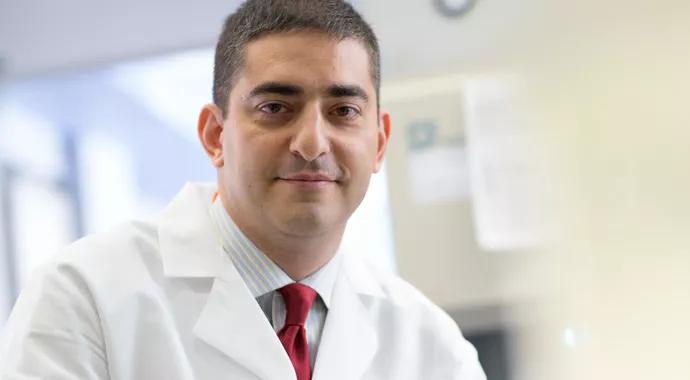Research grants support ‘game-changing’ diagnosis and treatment projects

Cleveland Clinic medical oncologist and prostate cancer researcher Nima Sharifi, MD, is a recipient of two of the six 2015 Challenge Awards presented by the Prostate Cancer Foundation (PCF).
Advertisement
Cleveland Clinic is a non-profit academic medical center. Advertising on our site helps support our mission. We do not endorse non-Cleveland Clinic products or services. Policy
The peer-reviewed, highly competitive grants are intended to support innovative research that has the potential to make near-term, “game-changing” impacts on prostate cancer diagnosis and treatment.
Dr. Sharifi is the principal investigator on one of the 2015 Challenge Award-winning projects, and a co-investigator on the second, each of which provides the research team $1 million over two years. His research focuses on metabolic and molecular mechanisms of resistance to hormonal therapy in prostate cancer.
“These awards recognize the outstanding prostate cancer research at Cleveland Clinic and continue to build on our tradition of team science that has substantive benefits for patient care,” said Eric A. Klein, MD, Chairman of Cleveland Clinic’s Glickman Urological & Kidney Institute.
When patients with late-stage or aggressive prostate cancers undergo chemical or surgical castration, their tumors shrink due to testosterone deprivation. However, tumors often recur, forming ultimately lethal castration-resistant prostate cancer (CRPC).
CRPC tumors gain their resistance to androgen-deprivation therapy by reactivating the androgen receptor. Tumors accomplish this primarily by acquiring the ability to synthesize their own 5α-dihydrotestosterone (DHT) from adrenal precursor steroids. Dr. Sharifi’s research has demonstrated the involvement of a previously underappreciated intermediate steroid metabolite – 5α-androstanedione – in prostate tumors’ synthesis of DHT. In 2013, Dr. Sharifi’s lab identified the first example of a mutation that increases DHT synthesis to promote hormone therapy resistance. This mutation can also be inherited as a variant of the enzyme 3β-hydroxysteroid dehydrogenase-1 (3βHSD1), which boosts the conversion of precursor steroids to DHT, thus enabling tumors to grow in the absence of gonadal testosterone.
Advertisement
The PCF Challenge Award-winning project for which Dr. Sharifi is the principal investigator aims to develop a diagnostic test to identify patients with the variant of 3βHSD1 that predisposes them to CRPC. This actionable biomarker could inform therapeutic decision-making and lead the way to tailored treatment, such as more intensive upfront hormonal therapy along with castration therapy, potentially increasing symptom-free and overall survival. Dr. Sharifi will lead a multidisciplinary team of basic scientists and clinicians at Cleveland Clinic and Mayo Clinic on the project.
“This grant gives the potential to change the standard of care in treatment-resistant prostate cancer,” Dr. Sharifi said. “This kind of strategy of personalized medicine will help us further our understanding of this deadly disease.”
Dr. Sharifi is a co-investigator on a second PCF Challenge Award-winning project that seeks to identify early biomarkers of anti-androgen treatment resistance. He will work with investigators from the University of Michigan and Washington University, using next-generation sequencing of prostatectomy specimens banked from a large clinical trial of radiation plus hormonal therapy to look for intrinsic resistance biomarkers and to define the clinical impact of the genetic alterations.
The PCF Challenge Awards go to high-risk, first-in-field and currently unfunded cross-disciplinary research projects that don’t fit conventional funding organizations’ requirements. Submissions undergo two rounds of peer review and are assessed for clinical relevancy and their potential to have near-term impact on standard of care. Fifty-five applicants representing 48 institutions in 13 countries competed for the 2015 awards.
Advertisement
Dr. Sharifi received a PCF Young Investigator Award in 2008 and was a co-investigator on a previous Challenge Award. He won the 2014 American Association for Cancer Research Award for Outstanding Achievement in Cancer Research, and previously received the Howard Hughes Medical Institute Physician-Scientist Early Career Award and the American Cancer Society Research Scholar Award.
Dr. Sharifi holds the Kendrick Family Endowed Chair for Prostate Cancer Research in Cleveland Clinic Lerner Research Institute’s Department of Cancer Biology. He is an associate staff member of the Glickman Urological & Kidney Institute’s Department of Urology and the Taussig Cancer Institute’s Department of Hematology and Medical Oncology. He received his medical degree from the University of Pittsburgh School of Medicine. He completed his internal medicine residency at Yale-New Haven Hospital and his medical oncology fellowship at the National Cancer Institute.
Images ©Russell Lee
Advertisement
Advertisement

First-of-its-kind research investigates the viability of standard screening to reduce the burden of late-stage cancer diagnoses

Global R&D efforts expanding first-line and relapse therapy options for patients

Study demonstrates ability to reduce patients’ reliance on phlebotomies to stabilize hematocrit levels

A case study on the value of access to novel therapies through clinical trials

Findings highlight an association between obesity and an increased incidence of moderate-severe disease

Cleveland Clinic Cancer Institute takes multi-faceted approach to increasing clinical trial access 23456

Key learnings from DESTINY trials

Overall survival in patients treated since 2008 is nearly 20% higher than in earlier patients